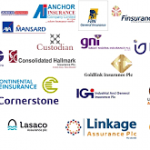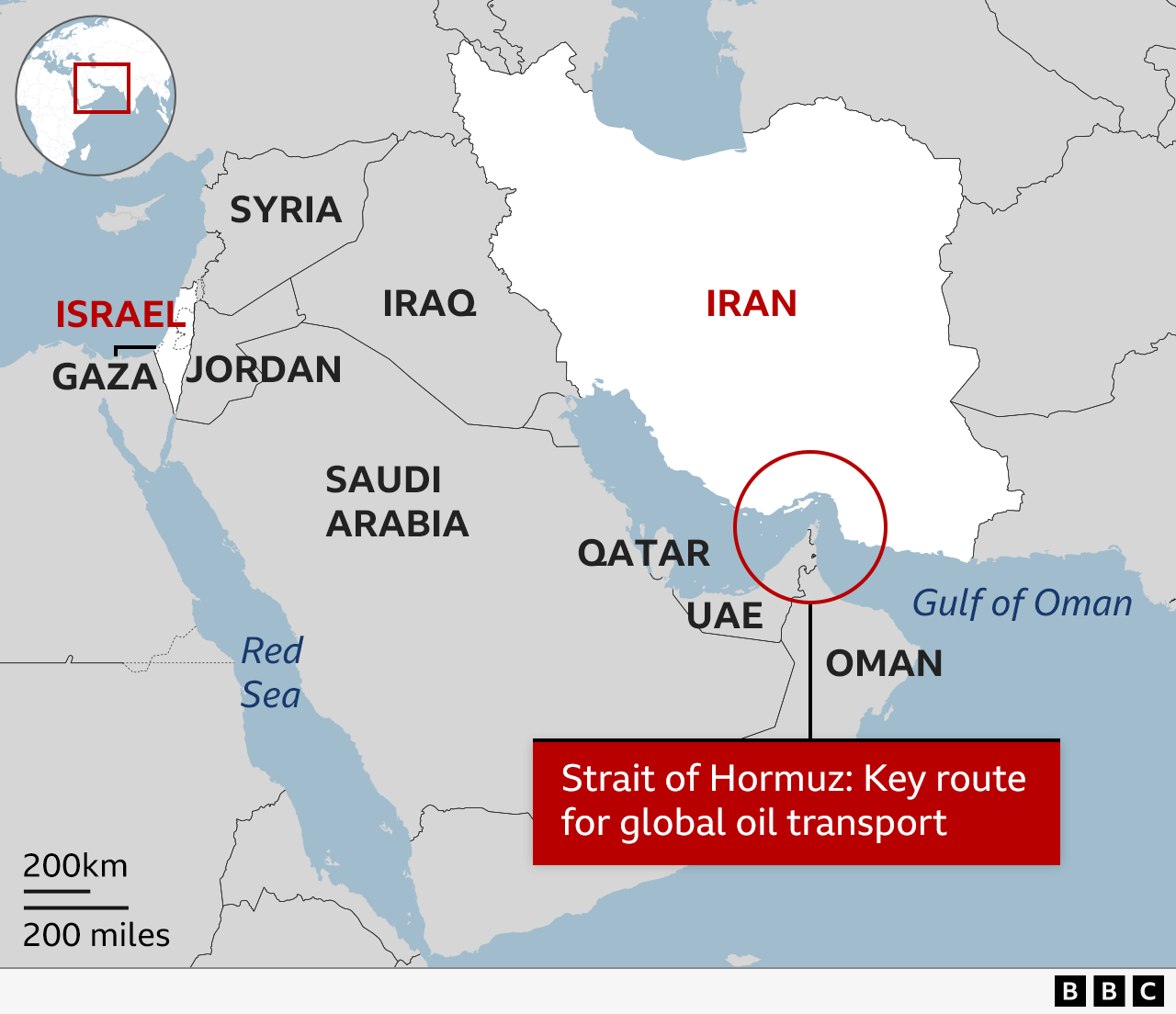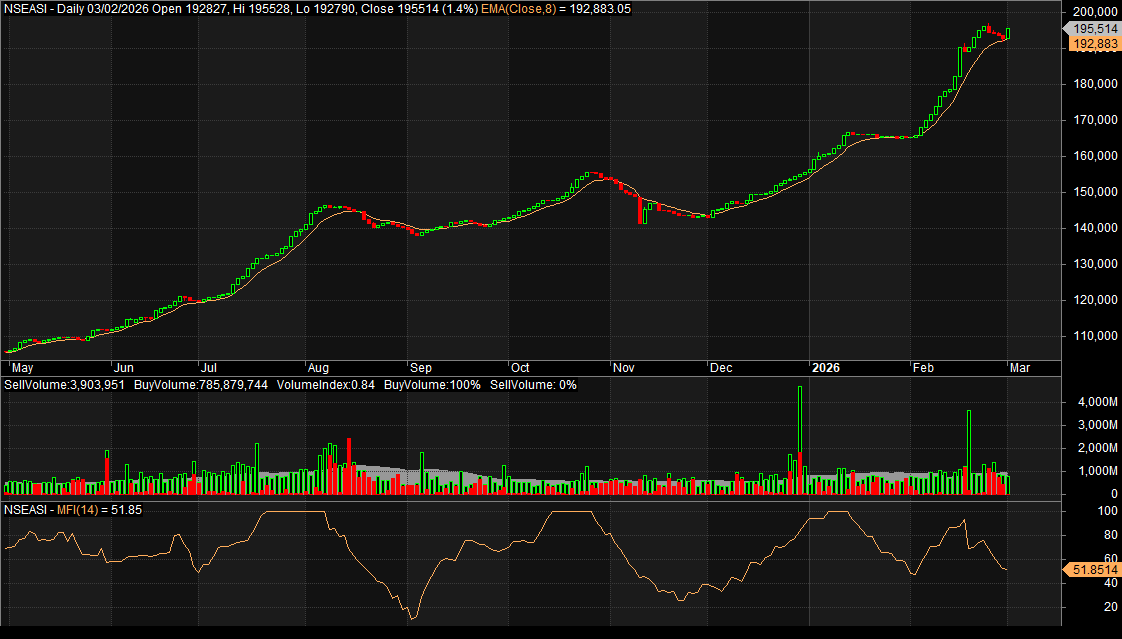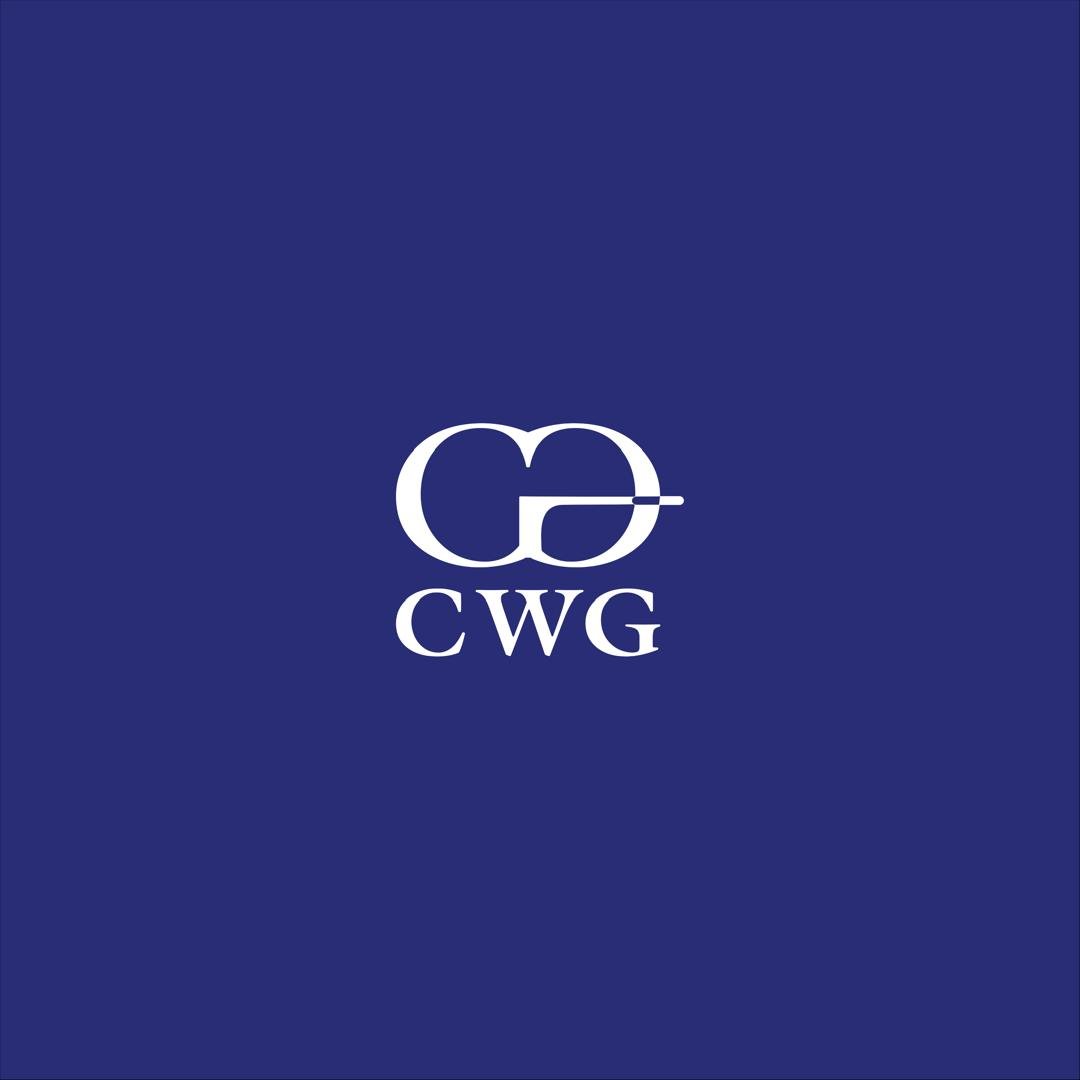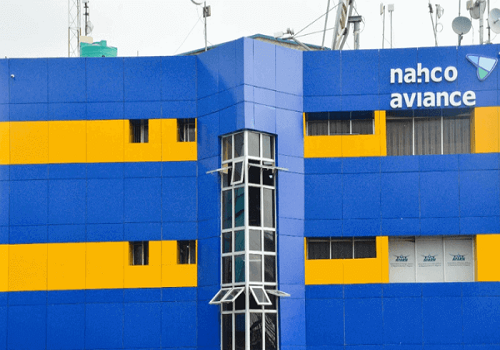
Tunde Segun Jeariogbe
The Nigerian Aviation Support Services industry is well advantaged, given the country’s high, youthful and growing population with a developing middle class. Even more advantageous is the strong regulatory reforms in the sector. Recent legislation such as the Civil Aviation Act 2022, which aims to strengthen the regulatory frameworks and align the sectors practices with international standards, which makes the sector more reliable for investment purposes. These couples with the fact that Nigeria is strategically located as a major hob in Africa, which gives the aviation sector its strategic importance.
Nevertheless, the sector is still faced with one or two challenges, particularly inadequate infrastructure which remains a major challenge that the government is working tirelessly to strengthen. We can also talk about the high operational cost which reduces the ease of entering into the business. Also going by the economic situation of the country, operational cost is now on the high side.
In all of these, we maintain that the sector is still very much attractive and stands a good chance of returning good profit to investors overtime, especially for service providers in the industry. The hike in the cost of handling luggage and other services is a plus to companies in that space.
NAHCO: Rising Revenue, Profit Power Robust Repricing
PARAMETERS:
Quarter Under Review: Half Year
Current Share Price: N105
Latest Dividend: N5.94
Estimated Beta Value: 0.46x
Estimated Intrinsic Value: N116.58
Structural Brief
The Nigerian Aviation Handling Company PLC (NAHCO) is a Nigeria-based ground handling company engaged in the provision of services, including aircraft, cargo, passenger handling, passenger profiling, crew transportation, energy and power distribution and leasing of ground handling equipment.
The company has three operational segments: Ground Handling, Cargo Handling and Others. The Ground Handling segment is engaged in ramp services, passenger profiling, baggage handling and crew transportation. Cargo handling entails cargo documentation services for airlines, import and export facilitation through customs bonded warehouses across the network. The ‘Other segment’ engages in equipment rentals and lease. NAHCO has two subsidiaries: NAHCO Free Trade Zone Limited (NFZ), an airport free zone created to provide storage, logistics and operational services; as well as Mainland Cargo Options Limited (MCO).
Revenue from non-Aircraft/Cargo handling services includes disinfection & other services, and equipment rental & maintenance services, through which the group leases its equipment to airlines for services that are not covered in the Standard Ground Handling Agreement (SGHA).

Financials
From the above, growing Turnover (TO) by 100.79% above the corresponding period, the management reported N32.32 billion sales through the first six month of the year, compared to N16.10 billion posted in 2024. Direct Cost of Sales equally grew by 82.85% to N13.16 billion as against N7.20 billion last half year. The increase in economic indices may have warranted corresponding increase in the Operating Expenses (including Human Capital Cost) Thus, Operating Expenses for the six-month stood at N7.78 billion same as 93.22% from the N4.02 billion in the similar period in 2024.
Although the amount spent on interest yielding funds increased against the corresponding quarter by 160.04%, The Net Finance Income remains positive at N154.49 million.
In all the six months business session achieved N8.87 billion Profit as against N3.33 billion in the comparable period in 2024.
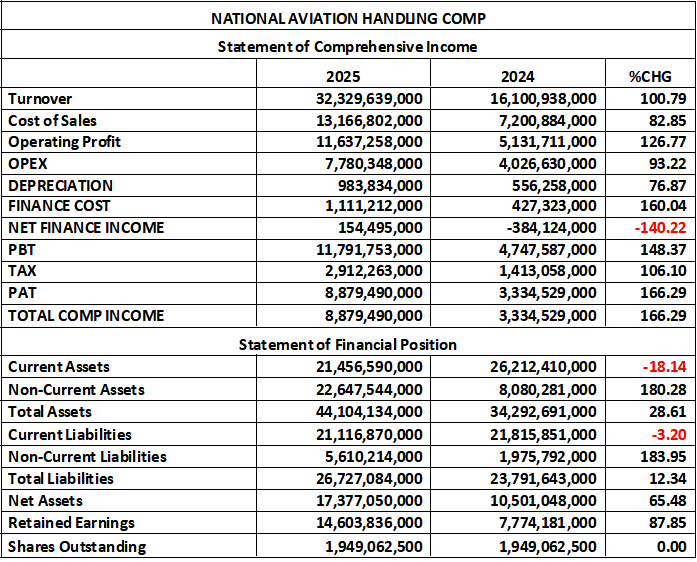
Current Assets at the end of the Period stood at 18.14% below the corresponding period while Non-Current Assets increased to N22.64 billion same as 180.28% above the N8.08 billion last year; thus, Total Assets is currently estimated at N44.10 billion compare to N34.29 billion in similar quarter of last year. Total Liability grew by 12.34% to stand at N26.72 billion. Business in the six month improved shareholders’ funds to N17.37 billion, higher than the N10.50 billion reported last year. See the above table for details.

Compared to the corresponding quarter, the management employed lesser debt, thus, the Debt Ratio dropped slightly by 12.65% to stand at 60.60% at the end of the quarter, following which ratio of Total Debt to Equity dropped to 32.11%. See the table above for details.

Explaining the Core Profitability of the company, we estimated EBITDA at 36.00% higher than the 31.87% in the corresponding quarter. This explains why the business is more profitable in the period under analysis, and due to the impressive growth in the Turnover, Cost of Sales was seen dropping slightly to Turnover despite the excessive increase in the prices of goods and services around the country. Return of Equity improved by 60.92% to 51.10%, compared to 31.75%.

Testing the management’s efficiency level, we estimated a marginal drop in Operating Expenses to Turnover Ratio, implying management’s effort to cub expenses, maintaining same rate as previous quarter. Showing outstanding performance is the Turnover against Total Assets Ratio, the ratio shows that the amount reported as Turnover is 73.30% of the Total Asset, this is a higher performance compare to 46.95% in 2024 half year.

Given the good performance and economic dictates, Investors repriced each unit of the company’s shares higher, as at the time the half-year numbers was released, the stock sold for N110.00 per share, as against N39.00 in the similar quarter of 2024. Earnings per share improved by 166.29% to N4.56; P/E Ratio adjusted up to 24.15x from 22.80x, even as yield on the earnings remained almost the same, due to the much price revaluation on the floor of the exchange.
Conclusion & Recommendations
Using the Sum-Of-The-Parts Valuation (SOTP) and Relative Valuation Methodologies (RVM), we arrive at a target price (TP) of ₦145.65 per share. Our TP here reflects a lower net debt position, increase in its capacity utilization on aircraft and cargo handling services, and improvement in capital structure management. Based on our TP price above, we therefore adjust our prior TP of ₦120.45 established in the Q1 ’25 earnings update. At the current TP, NAHCO currently carries an upward potential of 38.7% when compared to the recent closing market price of ₦105 per share.
Based on the above valuation and the compelling business case for the company going forward, we maintain a BUY rating on the company’s shares at the current market price of ₦105 per share.
CAVERTON OFFSHORE: Upward Potentials, But Turnaround Requires Fresh Capital Injection
PARAMETERS:
Quarter Under Preview: Half Year
Current Share Price: N6.65
Latest Dividend: Nil
Estimated Beta Value: 0.59x
Estimated Intrinsic Value: N2.26
Company’s Structural Brief
Caverton Offshore Support Group Plc is a Nigeria-based fully integrated offshore support company principally engaged in the provision of offshore services to the oil and gas industry, harbor and general marine operations, engaged in the provision of charter, shuttle and maintenance services of helicopters and airplanes to third parties. Caverton also provides marine and aviation logistics services to companies in the oil and gas industry. Business segments include Aviation service, Marine services, and other segments which are offered through subsidiaries include: Caverton Helicopters Limited, which engages in the provision of charter, shuttle, and maintenance services of helicopters and airplanes to third parties, and Caverton Marine Limited, which is focused on harboring and general marine operations.
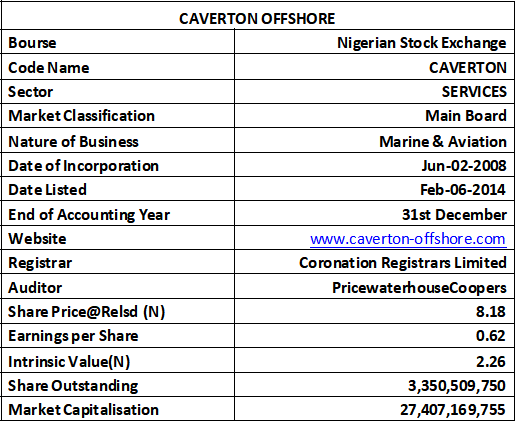
Financials
At the end of the half-year 2025 business session, the management reported a 14.20% drop in the Turnover (TO), from N18.79 billion to N16.12 billion. Cost of Sales dropped appreciably to N7.11 billion from N15.93 billion, representing a 55.37% slide. On this strength, Operating Profit grew by a vary significant 951.70% to N11.65 billion, against N1.10 billion in the corresponding quarter of 2024. Operating Expenses was curtailed as it only adjusted down by 1.14%. Thus, at the end of the business session, the company exited a negative profitability to the positive side, posting N2.08 billion as against the loss position of the corresponding period in 2024.
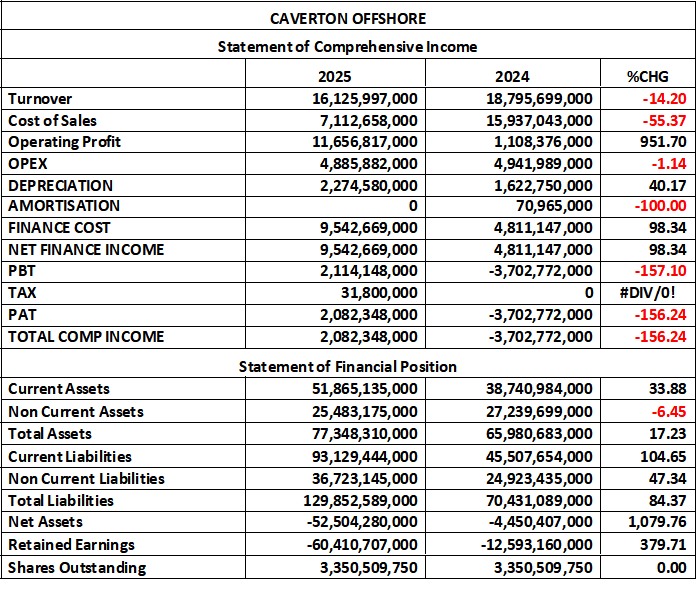
Current Assets stood tall at N51.86 billion from N38.74 billion in the comparable period. While Non-Current Assets adjusted marginally down by 6.45% to stand at N25.48 billion from N27.23 billion. In all Total Assets for the period is estimated at N77.34 billion compared to N65.98 billion in 2024 half year business session. Blighting the performance was the Total Liability that stood far above the Total Assets, at the end of the half year business session. The management recorded a Total Liability of N129.85 billion, compared to the N70.43 billion in the corresponding quarter, pushing Net Assets into negative territory at N52.50 billion, same as last year when it stood at N4.45 billion in negative. Please see the above table for details.

As shown above, the company’s liability is far higher than the Assets in both quarters compared in this analysis. Thus, Debt Ratio stood at 167.88% against 106.75%. The board and management will need to work harder to bring this ratio below 100%. By the same token, Equity Ratio is negative as shown in the above table.

Since the company is just exiting negative earnings, EBITDA stood at 72.29%, against 5.90% in the previous quarter. Pre-tax margin is now positive at 13.11%. Direct Cost of Sales dropped to 44.11% meaning that the direct cost increased per unit income during the period. And because the Net Assets is negative, the Return on Equity is marginally negative at 3.97% while Return on Assets is marginally green at 2.69%.

Management Efficiency can be rated average since Operating Expenses to Turnover is now below 50% though it grew slightly from 26.29% to 30.30%. Turnover to Total Assets Ratio stood at 20.85% as against 28.49%. See the above table for details.

Going by the inflationary enhancement, the investing public priced each unit of the company’s share higher at N8.18 compared to N3.65 in the corresponding period. As noted above, the total amount earned per share is N0.62 compare to the loss per share of N1.11 in the last half year. The said Earnings Yield stood at 7.60% of the price as at the time the result was made available to the investing public. Please understand that the Book Value Per Share is also negative, since the Net Assets is currently negative.
Conclusion & Recommendations
Regarding the ongoing turnaround in the company, which has started reflecting on its numbers as they turned positive compared to the previous year. Using the sum-of-the-parts valuation (SOTP) and relative valuation methodologies (RVM), we arrive at a target price (TP) of ₦12.05 per share. Our TP here is a reflection of the expanding businesses, increased capacity utilization on aircraft, cargo handling services, and improvement in capital structure management. At our TP price above, we adjust our prior TP of ₦9.00 established in Q1 ’25 earnings update. At the current TP, Caverton currently carries an upward potential when compared to the recent closing market price of ₦6.70 per share.
Based on the above valuation and the compelling business case for the company going forward, we maintain a BUY rating on the company’s shares at the current market price of ₦7.00 each.
SKYWAY AVIATION: Rallying On Positive Industry Sentiment, But Caution Is Key
PARAMETERS
Quarter Under Preview: Half Year
Current Share Price: N90.05
Latest Dividend: N0.60
Estimated Beta Value: 0.20x
Estimated Intrinsic Value: N90.56
Skyway Aviation Handling Company Plc (SKYAVN), formerly Skypower Aviation Handling Company Limited, was carved out of the liquidated Nigeria Airways in 1996 and acquired by the Sifax Group in December 2009. Incorporated in April 2009, it was listed on the Nigerian Stock Exchange in 2019. It provides comprehensive ground handling services, including aircraft handling, cargo handling, and passenger services, the company has invested heavily in modern equipment and infrastructure. SKYAVN is certified by international bodies, including ISAGO (IATA) and RA3 (European Union), demonstrating adherence to high operational standards.
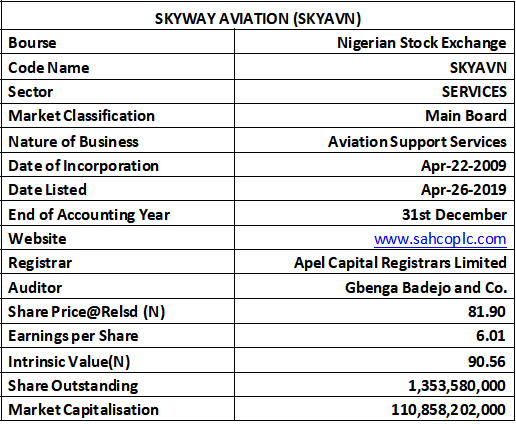
Financials
Looking at the financial statistics of Skyway Aviation (SKYAVN) for the half year ended 31st June, 2025, the management achieved a 73.94% growth in Turnover (TO) from N12.11 billion in the corresponding quarter to N21.06 billion in the current quarter. Cost of Sales grew by a faster 251.98% to N6.59 billion, against N1.87billion. The management may have been conservative in its interest yielding facilities with Finance Cost dropping by 13.79%, which is a commendable approach, considering the current interest rate. At the end of the business quarter, the management released an impressive Profit for the Period, as shown in the below table, Profit for the Period now stood at N8.135 billion same as 155.43% above the N3.185 billion posted in the corresponding period in 2024.
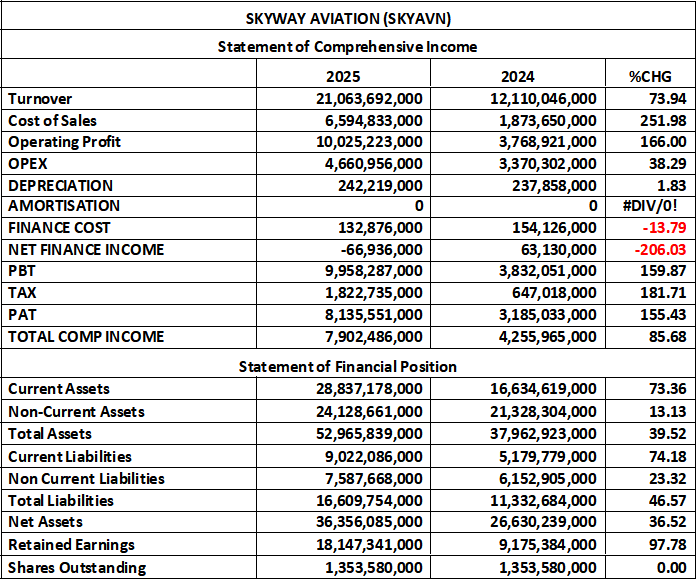
Current Assets builds by 73.36% to stand at N28.83 billion, compared to N16.63 billion in the corresponding quarter. Meanwhile the Non-Current Assets builds marginally by 13.13% to stand at N24.12 billion as against N21.32 billion in 2024. In all Total Assets grew by 39.52% to stand at N52.96 billion from N37.96 billion. In the same trend, Total Liabilities stood at N16.60 billion same as 46.57% above N11.33 billion in the similar quarter in 2024. Net Assets grew to N36.35 billion from N26.63 billion. Please see the above table for details.

Financial Strength
Looking at the company’s financial strength ratio, we commend the management for being intentional about strengthening its stand and that of the equity holders in the business. The Debt Ratio grew by a marginal 5.05%, standing at 31.36% as against the estimated 29.85% last year. Thus, Total Debt to Equity Ratio grew marginally at 45.69% from 42.56%, this is a fair stand considering the harsh operating environment.

Profitability Ratios
EBITDA Margin increased appreciably by 52.93% to 47.59% from 31.12% in the corresponding quarter. Similarly, Pre-Tax Margin increased by 49.40% at N47.28% from 31.64%, reflecting the increased inflation in the country where all commodities prices now tolls high, the Direct Cost of doing business doubled to 31.31% from 15.47%. Despite this, the return on every unit of equity held increased outstandingly to 22.38% from 11.96%, while Return on Assets grew by 83.08%. See the table below for details.

Efficiency Ratio
Though the cost of entry into the industry is quite high judging by the efficiency ratio estimated, we can say the business is quite efficient. For example, Operating Expenses is only 22.13% of the Turnover achieved for the period, just as the company achieved 39.77% of the estimated valuation of the entire Assets. This is not a very bad stand, and assures of reliance and better performance in the future.

Investment Ratios
Going by the consistent increase in prices across the country in recent years, Skyway Aviation’s share price has also been priced higher by investors, as shown in its price surge from N24.40 in 2024 to N81.90 as at the time the result was released. In the same trend, the amount earned per unit shares has grown to N6.01 from N2.35, nevertheless, the Total Comprehensive Income builds lower at N5.84 against N3.14 per every units of shares held. The earnings yielded lower at 7.34% as against 11.53% in the comparable quarter. The Book Value is currently low at N26.86 though it’s a growth from the N19.67 estimated in the corresponding half year.
Conclusion & Recommendations
This company has rallied on positive sentiment for its sector or industry, so market players should trade with caution and watch out on the dividend paying policy of the company. On a dividend discounting model, we arrive at a target price (TP) below its market value.
Based on the above valuation and the compelling business case for the company, going forward, we maintain a watch rating on the company’s shares at the current market price of ₦90.05 per share.


